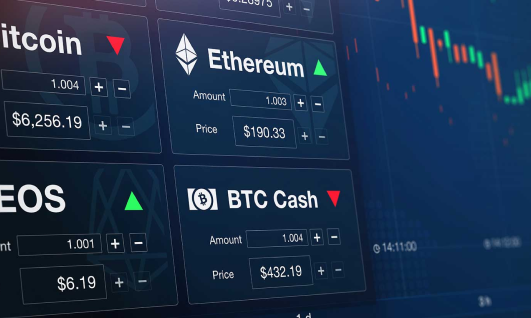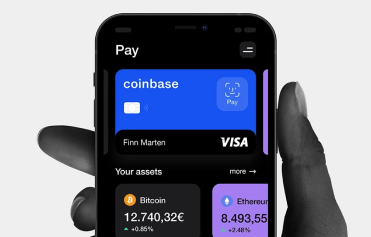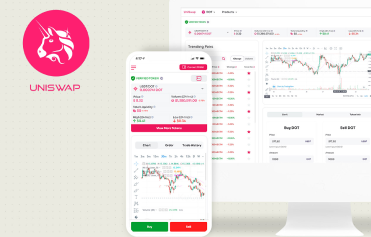Cryptocurrency Exchange Development
We Craft a Crypto Exchange Platform that Promises Seamless Trading Experience
Overview
Cryptocurrency Exchange Development Company
Through our holistic approach, we act as a one-stop-shop for your Crypto Exchange Requirements. Our team of experts understand your requirements and propose a feature-rich Crypto exchange platform that elevates your business outcome.
Accelerate your Crypto exchange development on a robust infrastructure for a world-class crypto trading experience.

Benefits We Serve for Cryptocurrency Exchange Software Development
We Serve a Horizon of Benefits to Our Esteemed Customers through Our Crypto Exchanges
Highly Secure
We offer additional login security and encrypted user access through two-factor authentication, OTP verification, email, SMS, SSL implementation, and multiple methods.
Whitepaper Drafting
We assist you in drafting a detailed whitepaper with all the specifications making it easier for you to present your crypto exchange platform in front of investors.
Intuitive Interface
We offer a self-explanatory and user-friendly interface for our Crypto Exchanges delivering an enhanced trading experience to the users.
Efficient Tracking of Transactions
Our Admin Panel is integrated with dashboard and analytics that enable measuring the performance, monitoring the activities, and tracking the transactions more efficiently.
Our Cryptocurrency Exchange Development Services
Develop and Deploy a Cryptocurrency Exchange of Your Choice with Us!

Centralized Crypto Exchange
The centralized Exchange Platform acts as a third party between the buyer and seller facilitating reliable crypto trading.

Decentralized Exchange Development
Decentralized Exchange Development facilitates crypto trading without the involvement of third-party eliminating the commission fees.

P2P Exchange Development
Leveraging the decentralization concept, P2P Exchange enables end-to-end trading where the escrow wallet is under the control of the admin.

Talk to Our Experts!
Get Consulted for Crypto Exchange Development!
Are you looking for a Cryptocurrency Exchange Development Company? You are at the right place, unlock the potential of our experts with just a click!
Features of Cryptocurrency Exchange Development Services
Multiple Cryptocurrency Integration
We develop a Cryptocurrency Exchange Platform that offers the flexibility to switch between multiple currencies and trade with the currency of your choice.
Multi-layer Security
Through two-factor Authentication, OTP verification, Email, SMS, SSL implementation, and multiple methods we offer additional login security and encrypted user access to ensure secure trading.
Matching Engine
Our Exchange platform is integrated with a powerful matching engine that matches the orders with the highest accuracy enabling instant buying and selling for users.
Device Compatible
We create an exchange platform that is compatible with all devices and can be accessed from anywhere.
Admin Panel
Our Admin Panel is integrated with a dashboard and analytics that enable measuring the performance, monitoring the activities, and tracking the transactions more efficiently.
What Else Do We Offer?
We are a Top-notch Blockchain and Cryptocurrency Development Company Offering Customized Services for your Business Demands
-
Cryptocurrency Development Services
-
Crypto Wallet App Development Services
-
Coin Listing Services
FAQ's
Frequently Asked Questions
Solutions, stories and thought leadership from across the company
What is white label cryptocurrency exchange development?
A white label cryptocurrency exchange development is defined as a ready-to-deploy solution consisting of a market-ready back-end and an easy-to-customize front-end. A white-label cryptocurrency exchange development is a feasible alternative delivering stability and security. Delivering a power-packed performance, speedy transactions, referral reward program, real-time insights, and appropriate liquidity.
What are the benefits of cryptocurrency exchange software development?
There are a wide range of companies offering cryptocurrency exchange software development services to a wide array of industries. The benefits of cryptocurrency exchange software development are:
- Seamless trading of crypto assets
- Fiat-to-crypto and vice-versa trading
- Heightened security of crypto-assets while trading
- Bridge the gap between buyers and sellers
How long does it take for cryptocurrency exchange development?
The time duration for cryptocurrency exchange development depends upon the customization preferences and the type of exchange platform. However, the customers who opt for tailored and white label cryptocurrency exchange development will avail the platform more quickly as compared to the platform that is to be developed from scratch.
What are the types of cryptocurrency Exchange development?
Three types of cryptocurrency exchange development are:
- Centralized Exchange Development:
The centralized exchange development depicts a traditional cryptocurrency exchange development in the crypto sphere. These exchanges are governed by a central authority offering both crypto-to-crypto and fiat-to-crypto trading.
- Decentralized Exchange Development:
Decentralized exchange development refers to an alternative to centralized exchange development. Since there is no central authority governing the assets there is no central point of failure.
- Hybrid Cryptocurrency Exchange Development:
Hybrid cryptocurrency exchange development is a combination of centralized and decentralized cryptocurrency development. It offers both speedy transactions and heightened security.
Let’s Get Started
Connect with our experts and schedule a meeting right away! Let’s take your project idea to the next level!
Want to develope other service?
Are you looking for a different service? Scroll yourself to our bundle of services and explore them!
News
Read our recent blogs
Solutions, stories and thought leadership from across the company

Nine Ethereum Future ETFs Go Live in the US
Historic Move in the Crypto Market: Nine Ethereum Future ETFs Go Live in the USThe crypto industry marks another significant chapter with the launch of nine Ethereum futures ETFs on the Chicago Board Options Exchange (CBOE). Esteemed investment entities like ProShares, VanEck, Bitwise, and others have introduced these funds, paving a new path for investors to gain exposure to Ethereum's potential without directly holding the asset.What This MeansA futures ETF allows investors to bet on the future prices of Ethereum without having to physically own the asset. It is crucial as it signifies a step toward a broader acceptance and institutionalization of cryptocurrency, offering investors a regulated and more secure way to invest in digital assets indirectly.Eye on PerformanceDespite the progressive move, the start has been tepid compared to the ProShares Bitcoin Strategy ETF launch in 2021, with only around $2 million traded as of 11:25am ET on the first day. Valkyrie’s Bitcoin and Ether Strategy ETF (BTF) took an early lead, while others linger with modest beginnings.The Spot ETF AnticipationSimultaneously, the market eagerly anticipates the approval of a spot crypto ETF, which would enable investors to have exposure to real-time cryptocurrency prices without holding the actual coins. Despite the optimism, SEC’s decision remains in abeyance amidst numerous applications from several prominent Wall Street entities.Ethereum's Current StanceAt present, Ethereum trades at $1,690, showcasing a subtle 24-hour rise of 0.5% and a near 7% uptick over the past week, as per CoinGecko. Yet, with an ever-dynamic crypto market, eyes remain glued to charts and global developments.Looking AheadThe amalgamation of traditional financial structures with cryptocurrency domains elucidates the progressive meshing of two worlds, offering diverse investment strategies and risk mitigation, especially for institutional and risk-averse investors.Understanding Ethereum ETFsAn Ethereum ETF allows investors to gain exposure to the price movements of Ethereum without having to directly purchase the cryptocurrency. Much like a regular ETF that tracks an index or sector, an Ethereum ETF invests in Ethereum futures contracts traded on exchanges like the Chicago Mercantile Exchange.When an Ethereum ETF buys these futures contracts, it does not physically own Ethereum. Rather, it makes a bet on the future price of Ethereum. If Ethereum prices go up in the future, the value of the ETF goes up. If Ethereum prices fall, the ETF loses value.The Benefits of an Ethereum ETFEthereum ETFs provide several advantages to investors: Regulated investment: Ethereum ETFs trade on stock exchanges and are regulated by government agencies like the SEC. This provides a level of oversight and security compared to investing directly in crypto. Easy access: Investors can buy or sell an Ethereum ETF through regular brokerage accounts like stocks and bonds. No need to set up a crypto wallet or exchange account. Lower barrier to entry: ETFs allow smaller investment amounts compared to direct Ethereum purchases which often have minimum buy-ins. Diversification: Ethereum ETFs help balance portfolios by providing exposure to crypto prices without the volatility of owning the asset directly. Custody and security: The ETF provider deals with storing and securing the Ethereum futures contracts, eliminating worries about losing private keys or hacks for investors.Why Invest in an Ethereum ETF?Here are some of the key reasons investors may want exposure specifically to Ethereum via an ETF: Growth potential: Many believe Ethereum has greater upside compared to Bitcoin based on its blockchain's ability to support decentralized applications and smart contracts. Upcoming upgrades: Ethereum is transitioning to proof-of-stake consensus and implementing sharding to greatly improve scalability and transaction fees, changes expected to boost Ether's price. DeFi and NFTs: Nearly all DeFi and NFT activity occurs on the Ethereum network today, with Ether serving as the native currency. Institutional interest: Major financial institutions have been showing greater interest in Ethereum and the ETH token compared to other altcoins. Mainstream adoption: Ether is the second largest cryptocurrency and has much wider mainstream use and familiarity compared to smaller market cap coins.Concerns Around Investing in an Ethereum ETFWhile Ethereum ETFs provide easier access for some investors, there are some drawbacks and risks to consider: No direct ownership: Investors do not actually own Ether tokens. Gains are purely driven by ETH price movement rather than factors like staking rewards. Tracking error: ETF performance may not exactly track Ethereum prices due to expenses, slippage on rolling over futures contracts, and other factors. Volatility and losses: Like Ethereum itself, Ethereum ETFs can see wild price swings. Investors without high risk tolerance could experience big losses. Premiums/discounts: ETF share prices may deviate significantly from the underlying Ethereum price due to low liquidity and investor flows in and out of the fund. Complex tax rules: Special tax regulations around crypto assets may apply when investing in an Ethereum ETF, creating paperwork headaches at tax time.Major Ethereum ETF ProvidersHere are some of the major financial institutions that have launched Ethereum ETF products so far:ProShares ETFs ProShares Ethereum Strategy ETF (ETH) ProShares Short Ethereum Strategy ETF (ETHS)VanEck ETF VanEck Inverse Ethereum Strategy ETF (ETHE)Valkyrie ETF Valkyrie Bitcoin Strategy ETF (BTF) - Holds both bitcoin and ether futures contractsGrayscale ETF Grayscale Ethereum Trust ETF (ETHE) - Converts to a spot ETH ETF if approved by SECOther providers Direxion, Bitwise, Etho, Defiance - Have filed for Ethereum ETFs pending approvalThe Outlook for Ethereum ETFsEthereum ETFs have gotten off to a relatively slow start in terms of trading activity and assets under management compared to the explosive launch of the first Bitcoin futures ETFs in 2021.However, most experts remain bullish on the long-term growth prospects for Ethereum ETFs due to: Rising interest and awareness around Ethereum and its game-changing technology The likelihood of an SEC approved spot Ethereum ETF being launched in the future Continued cryptocurrency adoption by retail and institutional investors Ethereum's leading position as the foundation for decentralized finance (DeFi), NFTs, and Web3Many anticipate assets under management in Ethereum ETFs to steadily grow over time as more institutional investors seek regulated exposure to Ether's price appreciation potential.The SEC approval process for a spot Bitcoin ETF took nearly a decade. With key lessons learned from those efforts, the timeline to a spot Ethereum ETF may be expedited significantly. Such an ETF would provide a convenient vehicle for mainstream investors to gain pure exposure to Ethereum's price movements.Until spot Ethereum ETFs trade in the US, the currently available futures-based funds provide helpful gateways into this rapidly evolving asset class, while having their own unique risk factors to evaluate.Examining the Growth of DeFi and Crypto ETFsThe launch of Ethereum futures ETFs comes at an opportune time given the massive growth that decentralized finance (DeFi) has experienced on Ethereum over the last two years.DeFi refers to financial applications built on blockchain networks that eliminate intermediaries like banks or brokerages. Everything from lending, borrowing, derivatives trading, and insurance can be replicated in a decentralized manner on platforms like Ethereum.Some staggering stats about DeFi growth: Over $100 billion in total value locked in DeFi protocols, up from just $1 billion in 2020. DeFi users have surpassed 3 million in 2022 compared to 30,000 two years ago. Popular DeFi apps like Uniswap and Aave routinely see over $1 billion in daily transaction volume.This meteoric rise has been enabled by the programmability and containerized smart contracts made possible by Ethereum. Along with the NFT mania, DeFi is a major catalyst driving mainstream crypto adoption.For investors, DeFi expands the investable landscape far beyond just holding or trading tokens. Yield farming, liquidity pools, crypto lending, algorithmic stablecoins, and more offer new ways to generate returns.While this can be complex for individual investors, Ethereum ETFs offer simple, regulated exposure to this exploding space. And as more of traditional finance moves on-chain, DeFi and Ethereum positioning will become increasingly relevant to institutional investors.Beyond ETFs, there are now over 800 total crypto funds with $65 billion in assets under management as of Q2 2022 according to Crypto Fund Research. This includes active mutual funds and hedge funds focused on trading digital assets.And major financial players like Fidelity, Goldman Sachs, and BlackRock have established or partnered with cryptocurrency custodians to enable these products.So whether via ETFs or professionally managed funds, regulated crypto investing is clearly gaining mainstream traction. Expect the options and assets invested to multiply in the years ahead as this technology moves from fringe to foundational.Evaluating the Top DeFi Protocols Driving Ethereum's GrowthEthereum's rise to become the preeminent blockchain for decentralized finance is directly tied to the success of its most popular DeFi protocols. Let's examine some of the top platforms fueling Ethereum's DeFi dominance:UniswapAs the leading decentralized exchange, Uniswap enables over $1 billion in daily crypto swap volume. Users can trade tokens directly without intermediaries and also provide liquidity to earn yields.MakerDAOMaker pioneered decentralized stablecoins with DAI, now supporting over $7 billion stablecoins in circulation. The protocol also allows users to leverage ETH holdings for loans.AaveAave is the top decentralized lending and borrowing platform with over $8 billion in total value locked. Users can lend and borrow dozens of crypto assets.CompoundOne of the earliest DeFi apps, Compound established the liquidity pool model for lending and earning interest on deposits. It currently has over $7 billion in assets.Curve FinanceCurve provides a specialized stablecoin exchange to promote liquidity and low-slippage swaps between various dollar-pegged cryptocurrencies.Yearn FinanceYearn optimizes lending and trading across DeFi with automated smart contracts, providing portfolio yields for deposits known as yVaults. It has $2 billion locked in its vaults.These leading DeFi protocols provide the basic financial building blocks that allow Ethereum to serve as a decentralized financial system. Their continued growth and innovation will be key drivers of ETH demand and price.Digging Into the Upcoming Ethereum 2.0 UpgradeEthereum is in the final stages of a major technical upgrade known as Ethereum 2.0 that will fundamentally change its underlying infrastructure.The upgrade consists of 3 main changes:The Merge to proof-of-stakeEthereum currently utilizes proof-of-work mining like Bitcoin to validate transactions and mint new ETH. This will transition to a much more energy efficient proof-of-stake consensus model.Sharding implementationSharding divides the blockchain into parallel segments to greatly increase transaction throughput. This will help reduce congestion and sky-high gas fees.Docking with mainnetOnce the beacon chain proof-of-stake system and shard chains are live, they will merge back with the original Ethereum mainnet to make ETH 2.0 complete.While technical in nature, this upgrade has major implications for Ethereum as an investment: Transition to PoS is expected to create a supply shock by reducing the issuance rate of new ETH by ~90% once mining ends. Greater transaction capacity and lower fees make Ethereum more usable for large-scale applications. Staking returns estimated at 7-12% post-merge provide more incentives to hold ETH long-term due to illiquidity when locked in contracts. Reduced risk of 51% attacks makes Ethereum more secure at the protocol layer under PoS. Significant energy usage cut reinforces Ethereum's appeal for ESG-focused institutional investors.There are still risks around such a monumental technical transition going smoothly. But the scope of this ambitious upgrade demonstrates why many believe Ethereum has a superior technical roadmap to Bitcoin and other blockchains.NFTs Continue Surging Higher on EthereumThe NFT mania kicked off in 2021 has shown little signs of abating in 2022, with transaction volumes and sales remaining robust in the Ethereum-based NFT market.In August 2022 alone, over $1 billion worth of NFTs traded hands according to market data from DappRadar. Ethereum accounts for nearly 60% of total NFT trading volume so far in 2022.Some major recent drivers of NFT demand on Ethereum include: Blue chip NFTs: Collections like CryptoPunks, Bored Ape Yacht Club, and Azuki continue setting new all-time high sale prices at auction. Mainstream adoption: Global brands like Adidas, Gucci, and Manchester City FC are launching branded NFT drops appealing to loyal customers. New use cases: NFTs are evolving beyond just profile pic art into areas like metaverse land plots, gaming assets, IP rights, ticketing, fan tokens, and certificates of authenticity for physical goods. Celebrity involvement: Mainstream musicians, athletes, and actors continue tapping into NFTs to engage with fans in new web3-powered ways.However, the overwhelming majority of NFT projects fail to gain any meaningful traction. For example, over 1 million NFT collections have been created, but less than 100 account for over 95% of trading volumes.As the space matures, true utility and network effects will determine the most valuable NFT assets. But in the meantime, expect more wild volatility and speculation as this nascent category evolves.For Ethereum bulls, the network's dominance over the NFT ecosystem bodes well for ETH's price due to: Growth of gas fee revenues earned from NFT minting and transactions Rising demand to use ETH as payment currency on NFT marketplaces Increased ETH being locked up in NFT-based decentralized autonomous organizations (DAOs)While many contend NFTs are a passing fad, their traction on Ethereum cannot be ignored as adoption continues accelerating in this burgeoning industry.Reviewing Regulations Around Ethereum and CryptoAs cryptocurrencies like Ethereum move closer to the mainstream, their interactions with government policies are growing increasingly important. Some key regulatory issues shaping the landscape include:TaxationThe IRS categorizes crypto as property for tax purposes. This creates potential tax obligations for trading, conversions, NFT sales, DeFi yield farming, and other events deemed taxable.DisclosuresPublic companies holding Bitcoin or Ethereum on balance sheets must disclose this as they would any other investment asset.Custody rulesBanks and financial institutions require approval for handling cryptocurrency and related products under stringent security and compliance standards.Sanctions evasionGovernment agencies closely monitor crypto networks for potential sanctions evasion, given the pseudo-anonymous nature of blockchain transactions.Stablecoin issuanceFiat-backed stablecoins require approval in many jurisdictions. Tether's settlement with NY AG highlights increased stablecoin scrutiny.Securities classificationsThe SEC persists in categorizing most crypto assets besides BTC and ETH as securities. This adds substantial red tape around development and exchange listings.ETF approvalsLaunching exchange-traded funds based on crypto still requires a lengthy regulatory process, given crypto's volatility and risks.As crypto assets play bigger roles in legacy structures like banking and public markets, expect more complex and fragmented policymaking around Ethereum and digital currencies in general. This can inhibit mainstream adoption long-term without balanced guardrails and regulatory clarity.Key Factors That Could Propel or Sink EthereumAs the second largest cryptocurrency and the leader in decentralized finance, Ethereum appears positioned for continued prominence. But its future remains highly contingent on a mix of internal and external factors.Potential catalysts: Successful transition to Ethereum 2.0 Surging DeFi and NFT activity Greater smart contract and enterprise blockchain adoption Mainstream investor acceptance after Bitcoin Rising institutional custodial and investment productsPotential risks: Technical or security issues delaying ETH 2.0 Competing blockchains capturing DeFi developer share Tighter regulatory scrutiny around crypto Prolonged bear market diminishing speculative appetite Failure of applications to achieve product-market fit beyond tradingEthereum has already exhibited an astonishing rise from its founding in 2015 to its dominance today. But crypto remains an emerging technology at the precarious intersection of finance and software. This presents a wide range of uncertainties around Ethereum specifically and crypto broadly over the next 5 to 10 years.While the risks are palpable, the mind-boggling pace of decentralized innovation makes tuning out the noise and assessing fundamentals objectively ever more important.Conclusion: The Institutionalization of Crypto is AcceleratingThe launch of Ethereum futures ETFs caps a landmark year for cryptocurrency in terms of mainstream adoption. Major milestones in 2021 and 2022 include: Bitcoin and Ethereum price repeatedly reached new all-time highs El Salvador approving Bitcoin as legal tender Record $30 billion in crypto VC funding in 2021 Skyrocketing NFT sales reaching billions in transactions Defi markets surging 10x to over $100 billion assets lockedLooking to build your own cryptocurrency exchange? RWaltz offers best-in-class crypto and blockchain development services to bring your exchange to life. With years of experience building secure, scalable exchanges for clients worldwide, our experts are ready to make your vision a reality.Book a free consultation now to discuss your projects like Token Development, NFT Marketplace Development, and others with our team. We'll assess your needs, provide expert guidance, and deliver a high-quality custom exchange that exceeds expectations. Don't wait - get in touch today and let RWaltz give you a competitive edge with innovative exchange development and blockchain solutions.

Decentralized Applications – The New Normal in the Digital World
Blockchain Technology paved the way for Decentralized Applications that are gaining media coverage today and will soon become popularly used applications. The Decentralized Applications space is flourishing with technology enthusiasts experimenting the new models. What is a Decentralized Application? A Decentralized Application or DApp depicts the digital programs that are executed on the peer-to-peer or Blockchain network instead of a single system. A DApp development is based on a decentralized network that is not controlled or managed by a single authority. DApps being developed on Blockchain ensures the safety and transparency of applications. The software is designed on a decentralized system and is governed by the consensus mechanism rather than a centralized authority. What are the features of Decentralized Applications? Decentralized:The decentralized feature depicts a framework that is maintained by a group of nodes, where information is stored in each node in the form of a distributed ledgerConsensus Mechanism DApp being autonomous, cryptographic hashing protocols i.e. proof of work and proof of stake help achieve consensus mechanism in the applicationIncentivized The Dapp development services offer incentivized system by rewarding the participation of network nodes in the DApp based on the terms and conditionsFault ToleranceDApps being decentralized, they eliminate a single point of failure turning to be more stable and secure than the conventional applications based on a centralized systemAutomation Enabling frictionless peer-to-peer transactions, DApp Development services pivot around the smart contracts that are the self-executable agreements ensuring automationWhat are the Benefits of Decentralized Applications? The Decentralized Applications cater to safeguarding the user’s privacy by eliminating the need to submit the KYC information. DApps use smart contracts to complete the transactions between the two anonymous parties without the need to rely on an intermediary organization. Decentralized Applications exist on a P2P network, so there is less possibility of application downtime. Being open-source, the Dapps are more secure and can be deployed faster.What is the Difference Between Centralized and Decentralized Applications?Wrap UpThe Decentralized Applications Development is the new normal in the technology world with the flourishing distributed network. They have gained momentum across the business world with their commendable advantages over the centralized ecosystem. Are you are looking for a Decentralized Application Development Company? RWaltz is here to here to integrate your ideas into Decentralized projects. Explore our DApp Development services and schedule a meeting with our technology enthusiasts to structure the plan of action.




